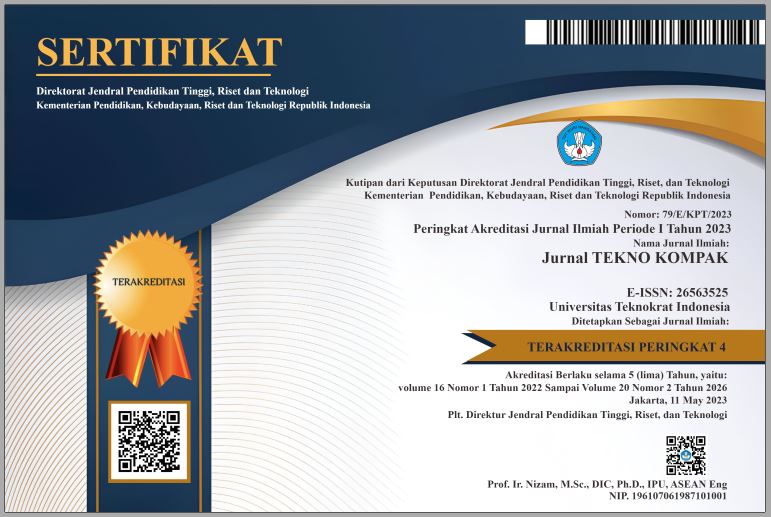Focus and Scope
Jurnal Tekno Kompak invites original articles and not simultaneously submitted to another journal or conference. The Scope topics include, but are not limited to:
- Design and Analysis Information System, Information System Development Methodology, Business Modeling Systems, Measurement and Evaluation of Information Systems,
- Measurement and Evaluation of Company Financial Statements, Accounting Application Development, Financial Accounting Application Development, Tax Accounting Application Development, Banking Application Development,
- Strategic Information Systems (Business Intelligence, Decision Support Systems, Executive Information Systems, Enterprise Systems, Knowledge Management Systems),
- Business Process Management, Business Modeling Systems, Management Information Systems, Economic Models for Information Systems, Business Forecasting Processes,
- Information Systems Audit, Change Management and Innovation in Information Systems, Information Systems and their Relationships in Competitive Business,
- Information Technology / IT Investment, Information Technology / IT Management, Human Resource Management and Information Technology / IT Organization, Information Technology / IT Strategic Planning, Information Technology / IT Investment Analysis, Information Technology / IT Project Management, Information Technology / IT Business Incubation,
- E-learning, E-Business, E-Health, E-Commerce, E-Supply Chain Management, E-Customer Relationship Management, E-Marketing, E-Government, Enterprise Systems,
- Management and Design of Enterprise System Architecture, Enterprise System Resource Planning Accounting Information Systems, Manufacture Information Systems, Academic Information Systems, Hospitality Information Systems, Transportation Information Systems, Resource Information Systems, Production Information Systems, Banking Information Systems, Enterprise Information Systems, Social Information Systems, Geographic Information Systems,
- Expert System, Data Mining, Machine Learning, Deep Learning, Big Data, Data Science
- Digital Library, Digital Marketing, Multimedia
- Software engineering, Human Computer Interaction, UI/UX
Section Policies
Articles
Peer Review Process
- The submitted manuscript is first reviewed by an editor for initial screening to the journal aims and scope and similarity level by using the Plagiarism Checker Engine.
- These manuscripts will be sent to at least two reviewers anonymously by applying Double Blind Peer-Review.
- Reviewers' comments are then sent to the corresponding author to take the necessary actions and responses.
- The decision of the revised manuscript will be then evaluated in an editorial board meeting, the final decision of whom are sent to the corresponding author.
- The reviewers will review the submitted article that follow the guidelines and template of the journal provided.
- The review process in this journal employs a double-blind peer-review, which means that both the reviewer and author identities are concealed from the reviewers, and vice versa.
- In the review process, the article will be reviewed by at least two reviewers to ensure the quality of the article.
- In the review process, the reviewers ensure the quality of the articles of its title, abstract, discussion and conclusion. Besides, the reviewers also address the novelty and its contribution to the scientific discussion and verify the plagiarism and ethics of publication.
- The reviewer also provide feedback on whether the article is accepted, rejected or need minor or major revision.
Publication Frequency
This journal will be published 2 issues per year (February, August).
Open Access Policy
Journal of TEKNO KOMPAK provides direct open access to its content on the principle of making scientific articles freely available to the public and supporting greater global knowledge exchange. By adapting The Budapest Open Access Initiative, this journal allows readers to read, download, copy, distribute, print, search for, or link to the full text of its articles and use it for other legitimate purposes. However, the works/articles in this journal are also tied to The Creative Commons Attributions-ShareAlike 4.0 International License.
















